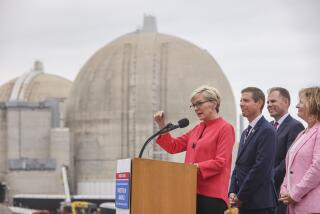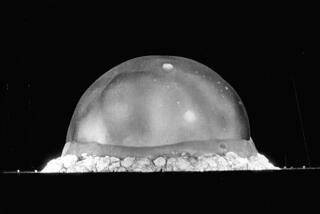U.S., Russia Plan Science Center : Diplomacy: Baker and Yeltsin approve facility to keep ex-Soviet experts from nations seeking to make nuclear bombs. Germany will assist with funding.
- Share via
MOSCOW — Russian President Boris N. Yeltsin and Secretary of State James A. Baker III agreed Monday to create a new science center to pay for peacetime research by the elite scientists who used to design Soviet nuclear weapons.
The plan, approved in a three-hour meeting in the Kremlin, will be launched with $25 million in American “seed money,” a sum that officials admitted was not enough to do the job. Germany agreed to provide additional support, although no specific figure was set.
According to a written statement issued by the United States, Russia and Germany, the center is intended to develop, select and fund scientific projects to be carried out at facilities in Russia and other states of the former Soviet Union.
A primary objective is to provide useful work for the cadre of nuclear scientists from the former Soviet Union to keep them from selling their expertise to Libya, Iran or some other nation seeking a backdoor entry to the nuclear club.
Russia also accepted an American offer of equipment and technical advice for the prompt, safe transportation and disposal of nuclear weapons. U.S. officials said that Washington will provide 25 secure railroad cars and 250 specially designed containers to move nuclear weapons. A new joint working group will be established to study the peaceful use of the plutonium and uranium to be removed from junked bombs.
Baker said the United States has agreed to pay much of the cost of storing Russian nuclear weapons to ensure that they are kept safe.
In a matter affecting the economic interests of Russia, Yeltsin said he requested $600 million in new loans for the purchase of U.S. grain because an earlier $3.75-billion line of credit will be exhausted by April 1, still months away from the Russian fall harvest. About $3.1 billion worth of grain has already been delivered under the earlier agreement, with about $650 million worth to be shipped during the next six weeks.
American officials said that Yeltsin also accepted their plan, originally offered last summer, for U.S.-Russian cooperation on space programs. Details were to be worked out later.
Yeltsin and Baker failed to reach agreement on any major new arms control measures, although the Russian president said they had made progress and predicted that a new pact slashing U.S. and Russian arsenals to the bone will be ready to sign when he meets President Bush later this year in Washington. Yeltsin said the meeting will take place in July, but a senior Administration official said that no date has been fixed.
Yeltsin said he and Baker agreed to terminate production of nuclear-carrying bombers such as the American B-1. The plan will have limited impact because the Pentagon has already stopped building B-1s, and the Administration has decided to curtail sharply the acquisition of B-2 Stealth bombers.
The meeting in the gold-trimmed Catherine’s Hall seemed to put American relations with Yeltsin on a business-as-usual basis. The Russian leader appeared at ease with his new role of world leader.
“We are getting to know each other,” Yeltsin said of Baker. “The secretary and I deal with each other more easily than we did about a year ago.”
In his joint news conference with Baker, Yeltsin revealed their agreement on the science center, apparently preempting a planned ceremonial announcement by Baker, Russian Foreign Minister Andrei V. Kozyrev and the German ambassador to Moscow.
Kozyrev wanted to go through with the ceremony anyway, but the Americans decided that an additional announcement would be pointless.
Last Friday, scientists at the top-secret laboratory that designed Moscow’s nuclear arsenal had appealed to Baker for the money needed to convert the facility to peacetime work during an extraordinary meeting in Chelyabinsk-70, a closed city on the Siberian side of the Ural Mountains. Baker then outlined the U.S.-Russian-German proposal but cautioned that nothing would be official until Yeltsin gave his approval.
Although Germany’s financial contribution was not set, the joint announcement said that the Bonn government would “advocate support for the initiative by the European Community and its member states.” A senior Administration official said private companies and other nations would also be asked to contribute.
The official said the $25-million American payment comes from a $400-million appropriation that Congress earmarked last year in the Pentagon budget to help Moscow pay for disarmament.
He added that high-level experts from the three nations will meet early next month to make plans to get the center into operation.
Yeltsin said he and Baker made good progress in their arms control talks. But he said that differences remain on such issues as counting the number of weapons in each country’s inventory and the number of warheads to be permitted on long-range nuclear missiles.
It was like a visit from the ghost of arms control past. For decades, the United States and the Soviet Union haggled over just such details in hammering out major weapons limitation treaties, such as the still-unratified Strategic Arms Reduction Treaty.
Baker and Kozyrev agreed to meet today, before Baker’s scheduled return to Washington, to discuss the issue in greater detail.
* GOLDMAN SACHS IN RUSSIA
The U.S. firm will help nation raise capital for expansion. D1
More to Read
Sign up for Essential California
The most important California stories and recommendations in your inbox every morning.
You may occasionally receive promotional content from the Los Angeles Times.













